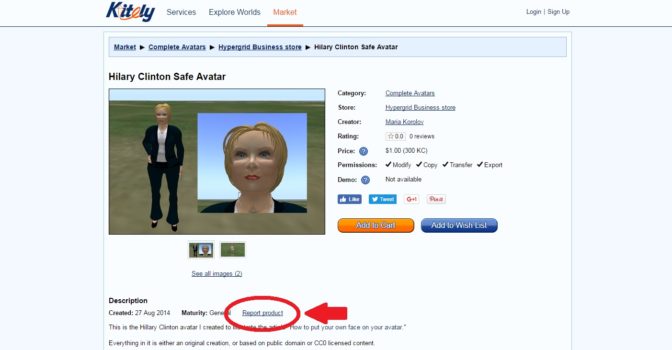- $6 for three years of protection against lawsuits from US creators — for any grid, anywhere in the world
- helps protect against take-downs by hosting companies and domain registrars
- helps keep creators from going to social media and blogs to get attention for problems
The US Copyright office has made it easier and much, much cheaper for content-sharing platforms — like social media sites and OpenSim grids — to protect themselves from lawsuits by people in the United States.
Previously, it cost $105 and people had to submit a PDF or mail in a form.
In December, it became a simple online process and the fee is just $6 for three years. Start here to register your DMCA Designed Agent. You can pay with a debit or credit card, or with a checking account.
There is no requirement that anyone register. But if they do register, and comply with take-down requests, then they get “safe harbor” protection from lawsuits.
Most other countries have similar laws in the books, typically without a registration requirement, with almost identical provisions for handling take-down requests. Complying with the US DMCA rules will generally put a company in compliance with similar “safe harbor” protections elsewhere.
Having good take-down procedures in place with also protect grids from the biggest copyright-related threat facing them: take down requests to their hosting companies and domain registrars. And, also, public shaming on social media sites and blogs when content creators can’t get a response from grid owners and take their issues public.
It is true that if you’re a small grid, content creators won’t bother to sue you because it’s just not worth the money. However, they will file a take-down request with your hosting company and registration provider. I do this all time, to sites located all around the world, and the sites go down. Usually, the very next day.
Yes, foreign grids can register — and should
I just checked out the form, and yes, you can put a foreign address for both your company and your designated agent. The agent is the person who is responsible for processing the take-down requests.
However, international companies often hire a US-based agent when they file a DMCA registration, according to California-based Internet law attorney Richard Chapo.
“The primary reason for this is international companies need a local resource to both act as the agent and be knowledgeable in handling copyright claims processed under the law of the United States,” he wrote. “Can you have a foreign DMCA agent? Yes, but it is not advised given the low cost of using an independent agent. There are services such as this one offering agents for $5 a month.”
Smaller companies who have fewer — and simpler — take-down requests, or handle everything online, can use an agent based overseas.

For example, the registered agent information for Israel-based Kitely Ltd. is here.
Kitely also has an easy-to-use content take down form and even a button on every Kitely Market listing that makes it easy for any user to report infringing content.

“It was a very straightforward procedure both before and after the change but the newer online system was a lot less time consuming than the previous one,” Kitely CEO Ilan Tocher told Hypergrid Business. “There is absolutely no excuse for an international company that hosts user generated content not to do this.”
He added that there were no requirements for Kitely to have an office or an other kind of official or legal presence in the United States.
“Many US-based copyright holders assume DMCA is universally applied and file DMCA take-down notices when they find their IP on unauthorized sites,” he said. “International companies that don’t respond as US companies would open the door to easily avoidable complications.”
Why register?
Nobody is required to register with the DMCA. Even US companies don’t have to do it. The DMCA law is not like a law against speeding, or beating someone with a baseball bat.
The DMCA is there to protect companies against lawsuits by American content creators. If you have content from US creators on your grid, or US creators think that their content is on your grid, they can sue — unless you register with the DMCA and follow their take-down requirements.
You might think that your grid isn’t big enough for creators to go after. Law suits cost a lot of money, especially if the offender is in a foreign country.
You’re right. But they don’t have to file a law suit to put your company out of business. They can simply file a take-down request with your hosting company or domain registrar.
In order for hosting companies to maintain their own “safe harbor” against lawsuits, they must themselves comply with take-down requests. Even tiny ones. Because if they ignore the small take-down requests from OpenSim shoe designers, then they lose their protection against all lawsuits, including those from deep-pocketed Hollywood movie studios.
The folks who make a living from copyright infringement and other illegal activities look for “bullet-proof” hosting providers. These are companies that use a variety of small data centers in multiple countries, and move sites around quickly when one of these centers is taken down. Those providers that are particularly successful get targeted by international law enforcement authorities working together across jurisdictions. Their primary goal is to prosecute money launderers, cybercriminals and ransomware extortionists, but the folks doing minor copyright infringement also get swept up in the take-downs.
In any case, is disregard for the law any basis under which a company wants to operate? Commercial grids who need to attract content creators and merchants and rent-paying residents to be successful won’t go far with that kind of attitude.
I am not a lawyer, so do not take this as legal advice. But I did cover international copyright law when I was based in China, and have been covering cybersecurity for CSO and other technology publications for more than 15 years.
- OSgrid back online after extended maintenance - April 16, 2025
- Analysts predict drop in headset sales this year - March 25, 2025
- OSgrid enters immediate long-term maintenance - March 5, 2025

